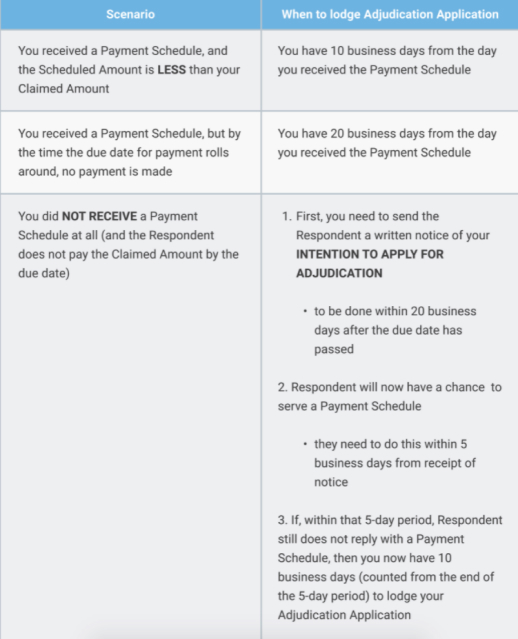Security of Payment Act: A quick rundown
Under the Building and Construction Industry Security of Payment Act 1999 (NSW), a.k.a. Security of Payment Act (NSW), you may claim progress payments by simply serving a Payment Claim on the person who owes you (let’s call them the “Respondent”).
The Respondent may then either pay your claimed amount on the due date (in your construction contract), or serve you a Payment Schedule, if they propose to pay a different (usually, lesser) amount.
How Can Payment Be Enforced?
If you disagree with their proposed payment amount (“scheduled payment,”), or if they refuse to pay the amount they promised, or if they neither serve a Payment Schedule nor pay your claimed amount, you need not worry.
The Security of Payment Act (NSW) gives you options for enforcing payment. These are:

Adjudication
IMPORTANT! : Adjudication Timelines

In other words, in the third scenario:
- Respondent does not serve a Payment Schedule. As a result, the entire Claimed Amount becomes due.
- In this case, adjudication is not your immediate recourse.
- If Respondent does not pay said Claimed Amount by the time it is due, you need to give them another chance to serve a Payment Schedule (by sending them a notice that you intend to apply for adjudication - this is like a warning shot).
- Hence, for failure to serve a Payment Schedule coupled with failure to pay Claimed Amount, Respondent will nonetheless be given a fresh period of 5 business days (from receipt of Notice of Intention to Apply for Adjudication) to serve a Payment Schedule.
- You may only commence adjudication if Respondent thereafter still fails to serve a Payment Schedule, despite having been given a chance to do so.
- So, if after 5 business days, they still don’t serve a Payment Schedule, your Claimed Amount will be an enforceable debt.
- You will then be given 20 business days from due date for payment, to prepare and serve an Adjudication Notice (a.k.a. “S.17(2) Notice re: No Payment Schedule).
Litigation
You may also opt to bring the collection case to court instead of going through adjudication. This would take longer and entail a greater expense, though.
Suspension of Works





